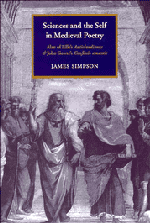 Sciences and the Self in Medieval Poetry
Sciences and the Self in Medieval Poetry Book contents
- Frontmatter
- Contents
- Acknowledgements
- List of abbreviations
- 1 Introduction
- 2 The outer form of the Anticlaudianus
- 3 A preposterous interpretation of the Anticlaudianus
- 4 Alan's philosopher–king
- 5 Ovidian disunity in Gower's Confessio amantis
- 6 Genius's psychological information in Book III
- 7 The primacy of politics in the Confessio amantis
- 8 Poetics
- 9 Conclusion: varieties of humanist politics
- Works cited
- Index
- CAMBRIDGE STUDIES IN MEDIEVAL LITERATURE
5 - Ovidian disunity in Gower's Confessio amantis
Published online by Cambridge University Press: 15 December 2009
- Frontmatter
- Contents
- Acknowledgements
- List of abbreviations
- 1 Introduction
- 2 The outer form of the Anticlaudianus
- 3 A preposterous interpretation of the Anticlaudianus
- 4 Alan's philosopher–king
- 5 Ovidian disunity in Gower's Confessio amantis
- 6 Genius's psychological information in Book III
- 7 The primacy of politics in the Confessio amantis
- 8 Poetics
- 9 Conclusion: varieties of humanist politics
- Works cited
- Index
- CAMBRIDGE STUDIES IN MEDIEVAL LITERATURE
Summary
INTRODUCTION
Once the creative information of the Anticlaudianus is understood, its philosophical information (in the modern sense) looks very different. The only way to make sense of the incongruences of the poem's outer form is to read the poem in a different, artificial order. Once one reads in this way, the peculiar outer form of the poem can be explained by its inner form; equally, the inner form produces a reading of the poem as the information, or education, of a single soul. Understanding of the poem's artistic information reveals that the poem represents a pedagogic information. And this in turn modifies the evident philosophical content of the poem: as the learning experience of a single soul, the Anticlaudianus reveals how the soul both requires and structures knowledge for its fulfilment. So far from being an encyclopaedic work, a mere gathering of instructional matter, we have seen that the poem represents the teaching (or information) of a single soul. A psychology underwrites a movement through an ethics and a politics to a cosmology and a theology. Equally, the theology and cosmology point back to a politics. The poem reveals the pull between different discourses as the sciences are traversed by the individual soul.
What possible value could this set of observations have for understanding Gower's Confessio amantis, written a little over two hundred years later? There are, certainly, blocks of ‘scientific’ matter in the English poem, notably the divisio philosophiae of Book VII, but, my reader will object, the philosophic information of the poem is relatively restricted in scope.
- Type
- Chapter
- Information
- Sciences and the Self in Medieval PoetryAlan of Lille's Anticlaudianus and John Gower's Confessio Amantis, pp. 134 - 166Publisher: Cambridge University PressPrint publication year: 1995


